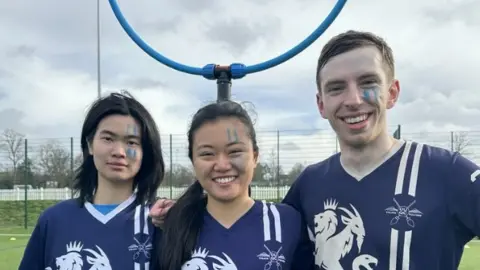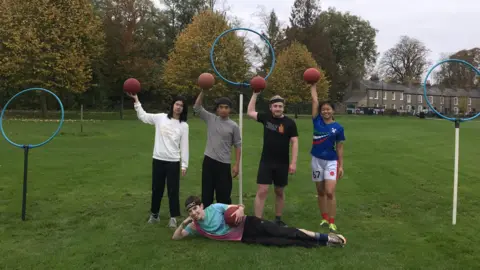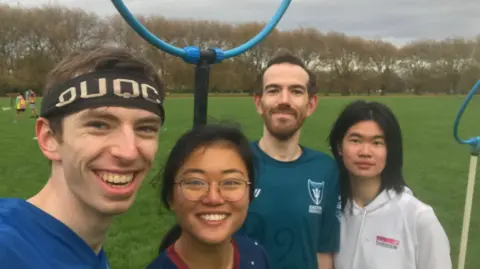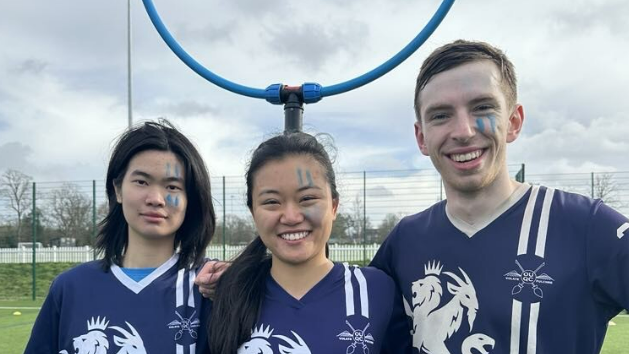
The president of a Quadball club says although there is a lot of curiosity around the game, recruitment can be tough.
Originally based on Quidditch, made famous by the Harry Potter books, it is believed to be one of only a few mixed-gender, full-contact sports in the world.
William Brilliant, a first year Astrophysics PHD student at Cambridge University, hopes to encourage people to try it.
Mr Brilliant said it was “crowded” competing for recruits with other societies, but he was hopeful the club could build “momentum”.

It has been nearly 20 years since Quidditch moved from the pages of Harry Potter to real-life playing fields.
Quadball, which had to rename itself from Quidditch, is played by nearly 600 teams in 40 countries
Players aim to beat the opposite team by scoring volleyballs, defending with tackles and dodgeballs or catching a flag.
The club has been running for about 10 years, apart from a break during the Covid-19 pandemic. Regular socials have about eight people attending.
It is essentially played as it appears in Harry Potter, but sadly, players cannot fly and instead manoeuvre round the field on foot while astride a broomstick.
Mr Brilliant said he had seen the films and read the books, but had no idea it was a sport until free pizza enticed him to a taster session.
“Quadball is unlike any other sport,” he said.
“It’s not like football or netball or hockey, where people have been doing it since they were eight years old and have had all that time to get very good.
“No one’s done it before, everyone starts equally bad. As a team, as a group, you can move up together and that’s honestly I think a fantastic team dynamic to have.”

Perhaps the best-known element of the game is the golden snitch, famously very nearly swallowed by Harry Potter during his first-ever Quidditch match.
But instead of a winged, walnut-sized ball, real-life seekers chase a flag runner dressed in yellow, who has a sock with a tennis ball in attached to their shorts.
Mr Brilliant plays as a beater who disrupts play by throwing dodgeballs at opposing players.
If hit they must dismount their broom and run back to their own hoops to tag back in.
A Quadball university league in the UK is run by Quadball UK, and hosts tournaments between teams.
As a former member of the club in Oxford, Mr Brilliant said recruitment for the sport in Cambridge had started slightly slower.
“It’s definitely a little tough,” he said.
“It’s a crowded space. There are hundreds of societies and dozens of new sports.
“At Cambridge we started a little slow we didn’t have anything to build off of initially, but I have good hopes we can begin to build up some momentum and keep going up.”
Follow Cambridgeshire news on BBC Sounds, Facebook, Instagram and X.
More like this story
- Can Quidditch thrive as Quadball?
- Inside the British Quidditch Cup
- From page to pitch: How Harry Potter’s Quidditch became a real-life sport
Related internet links
University Quadball team hoping to build momentum
 William Brilliant
William BrilliantThe president of a Quadball club says although there is a lot of curiosity around the game, recruitment can be tough.
Originally based on Quidditch, made famous by the Harry Potter books, it is believed to be one of only a few mixed-gender, full-contact sports in the world.
William Brilliant, a first year Astrophysics PHD student at Cambridge University, hopes to encourage people to try it.
Mr Brilliant said it was “crowded” competing for recruits with other societies, but he was hopeful the club could build “momentum”.
 William Brilliant
William BrilliantIt has been nearly 20 years since Quidditch moved from the pages of Harry Potter to real-life playing fields.
Quadball, which had to rename itself from Quidditch, is played by nearly 600 teams in 40 countries
Players aim to beat the opposite team by scoring volleyballs, defending with tackles and dodgeballs or catching a flag.
The club has been running for about 10 years, apart from a break during the Covid-19 pandemic. Regular socials have about eight people attending.
It is essentially played as it appears in Harry Potter, but sadly, players cannot fly and instead manoeuvre round the field on foot while astride a broomstick.
Mr Brilliant said he had seen the films and read the books, but had no idea it was a sport until free pizza enticed him to a taster session.
“Quadball is unlike any other sport,” he said.
“It’s not like football or netball or hockey, where people have been doing it since they were eight years old and have had all that time to get very good.
“No one’s done it before, everyone starts equally bad. As a team, as a group, you can move up together and that’s honestly I think a fantastic team dynamic to have.”
 William Brilliant
William BrilliantPerhaps the best-known element of the game is the golden snitch, famously very nearly swallowed by Harry Potter during his first-ever Quidditch match.
But instead of a winged, walnut-sized ball, real-life seekers chase a flag runner dressed in yellow, who has a sock with a tennis ball in attached to their shorts.
Mr Brilliant plays as a beater who disrupts play by throwing dodgeballs at opposing players.
If hit they must dismount their broom and run back to their own hoops to tag back in.
A Quadball university league in the UK is run by Quadball UK, and hosts tournaments between teams.
As a former member of the club in Oxford, Mr Brilliant said recruitment for the sport in Cambridge had started slightly slower.
“It’s definitely a little tough,” he said.
“It’s a crowded space. There are hundreds of societies and dozens of new sports.
“At Cambridge we started a little slow we didn’t have anything to build off of initially, but I have good hopes we can begin to build up some momentum and keep going up.”
Follow Cambridgeshire news on BBC Sounds, Facebook, Instagram and X.











